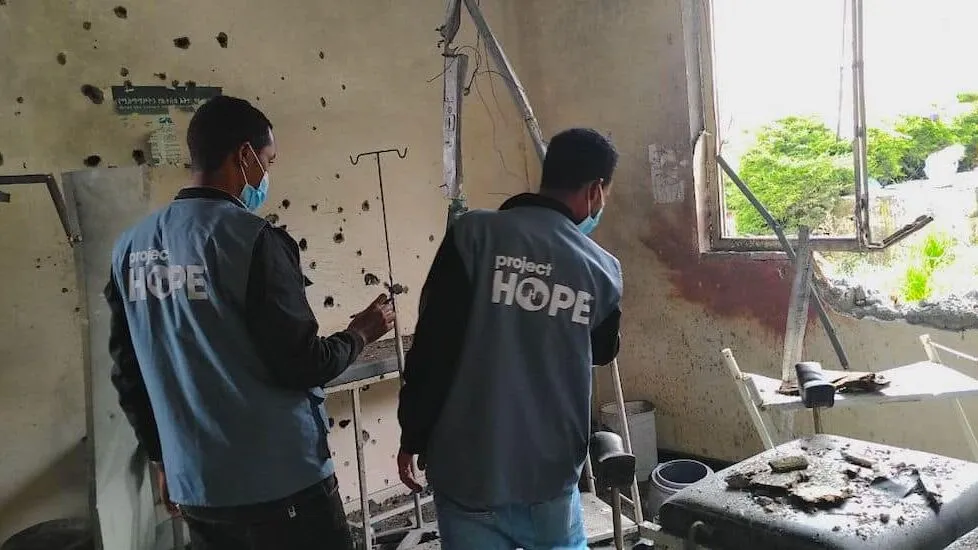4 Facts: What is a Complex Crisis?
Many countries around the world are in protracted crises, enduring the challenges of disease outbreaks, natural disasters, or longstanding conflict all at once. Here are four facts to better understand complex crises and their impact on health.

A record 100 million people are displaced by conflict and natural disaster around the world. This number has risen every year for the last decade and is expected to continue to rise as conflicts and crises become more and more common.
Many of these situations are known as complex crises — also referred to as protracted crises or complex humanitarian emergencies — where multiple emergencies occur at once. Though the origin of each crisis is unique and complex, the result is always the same: the deterioration of basic services and the suffering of millions of innocent civilians.
Here are four facts to better understand complex crises and the toll they take on global health.

Fact 1: A complex crisis is when an acute emergency occurs in a place where there is already ongoing instability.
A complex crisis occurs when multiple challenges stack on top of one another — when a natural disaster or public health emergency (such as a pandemic or epidemic) layers on top of conflict, civil war, or political strife. The United Nations defines a complex humanitarian emergency as “a humanitarian crisis in a country, region, or society where there is total or considerable breakdown of authority as a result of internal or external conflict and which requires an international humanitarian response.” These conflicts usually result in large-scale displacement, can result in severe malnutrition or famine, and make delivering humanitarian aid difficult and dangerous.
One example is the current situation in the Horn of Africa, where ongoing conflict and the worst drought in four decades have put more than 20 million people in need of urgent humanitarian assistance.
As a global health organization, Project HOPE focuses on reaching affected populations with the health services they need to persevere in the face of compounding crises, including in Ethiopia. Project HOPE implements a range of relief programs in Ethiopia, particularly in Northern Ethiopia, focused on improving reproductive, maternal, newborn, and child health and combating the spread of HIV/AIDS and COVID-19. Right now, our teams are working to expand access to lifesaving mobile health and nutrition services to provide essential medicines, vaccines medical supplies, and ready-to-use therapeutic foods, with a focus on supporting women, children, and people living with or affected by HIV.

Fact 2: In the early stages of a complex humanitarian emergency, diarrheal diseases, respiratory infections, measles, and malaria are some of the greatest health threats.
When conflict spurs upheaval and people are initially displaced, they are often forced to live in crowded and unsanitary conditions, and struggle to access safe water, sanitation, food, vaccines and health care. Under such drastic circumstances, infectious and water-borne diseases are some of the most serious health threats, even though they are entirely preventable and treatable risks.
Our teams in Ethiopia are seeing this in displacement camps now. This was also the case in Yemen, where measles made a deadly resurgence soon after the country fell into crisis. After more than seven years of unrelenting conflict in Yemen, almost three-quarters of the population has become dependent on humanitarian assistance. Only half of health facilities are fully functioning and more than 80% of people of people struggle to access safe drinking water, food, or health services. Last year, the country had the second-highest caseload of measles in the world, after Somalia.
Project HOPE has worked through the Humanitarian Alliance for Yemen to deliver food, medical supplies, medicines, and critical medical services to the people who needed it most.

Fact 3: Complex crises often lead to severe hunger or malnutrition.
Over time, as a situation worsens and access to food becomes more and more challenging, malnutrition usually becomes one of the biggest health challenges.
According to the World Food Programme, most of the world’s worst food crises are caused by conflict. Almost 60% of the world’s hungry people live in conflict zones. Children who live in areas of conflict are more than twice as likely to experience malnutrition. Four out of every five children stunted by malnutrition live in countries affected by conflict.
In Yemen, a record 19 million people are going hungry and 2.2 million children are suffering from malnutrition. In the Horn of Africa — where the challenges of drought have been compounded by conflict and COVID-19 — up to 25 million people are at risk of food insecurity and more than 1.7 million children need treatment for severe acute malnutrition.
In Ethiopia, Project HOPE is providing health and nutrition support to prevent needless suffering, especially in rural communities that struggle to access care. As part of our expanding relief work in Ethiopia, our mobile health and nutrition teams are providing ready-to-use therapeutic foods (RUTF) like Plumpy’Nut, an energy-dense food designed to provide nutritional rehabilitation for children as young as six months.

Fact 4: Women and children bear the brunt of crisis.
Crisis puts women and children at greatest risk. In Yemen, recent reports suggest one mother and six newborns die every two hours as a result of health shortages. The maternal mortality rate is one of the highest in the world and continues to worsen as the health system deteriorates.
In Venezuela, years of social, economic, and political turmoil have led to a critical shortage of health workers, medicine, and supplies and an alarming rise in maternal and infant mortality rates as well. A 2019 survey found four in ten hospitals had a shortage of basic supplies like disinfectant and sterilizers and eight out of 10 did not have enough surgical tools or medicine. The same survey found half of maternity hospitals to have obstetrics wards partially or fully out of service. In just one year, infant mortality increased almost a third and maternal mortality grew by 65%.
More than 6 million people have fled Venezuela over the past seven years — many of them in search of lifesaving health care. Project HOPE is working on the border to help the Colombian health system receive and care for the migrants and refugees preparing for delivery and in need of pre- and post-natal care.







